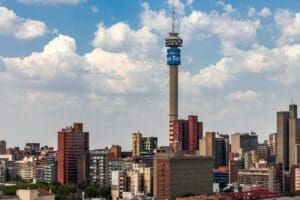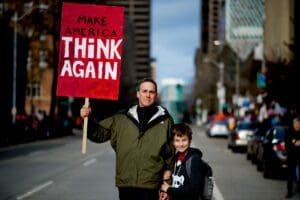By Brett Herron
See original post here.
There is no greater threat to our collective wellbeing in SA than poverty and hopelessness. Yet for far too long government has simply flirted with the idea of a Basic Income Grant (BIG), providing nice political sound bites rather than nutrition to the millions who desperately need it.
It was therefore encouraging to learn that we are moving closer to this reality. In a written parliamentary reply to my question, the department of social development indicated that it will be seeking cabinet approval to publish a draft policy on a BIG for public comments in the current financial year.
The department further proposed that the current Social Relief of Distress (SRD) grant be extended until the end of the 2025/26 financial year, to allow for time to finalise work on a more permanent and sustainable intervention.
According to Stats SA, the monthly cost of food sufficient to sustain an adult individual has increased by nearly 15% over the past year, to R760. This is known as the food poverty line.
There are about 7.5-million SA adults drawing the temporary R350 SRD grant at present. To qualify beneficiaries must demonstrate that they are unemployed and have a monthly income of less than R624.
The reality is that many of the 7.5-million have zero income besides the grant, and the state is paying them R350 when according to its own calculation they need a minimum of R760 just to eat.
Many of them are young people, including matriculants and graduates of tertiary institutions, and the overwhelming majority are people of colour.
Even if SA’s economy were to spring back to life (which no economists predict) it would take significant time to deflate its 11-million person unemployment bubble.
A country of SA’s relative wealth, that is unable to take care of the most basic needs of millions of its people, lacks basic humanity and sacrifices its sustainability. It creates a tinder box of injustice, indignity and despair — an environment in which many feel they have little left to lose.
It was reassuring to hear the president himself state, a few days after Stats SA released the updated 2023 poverty lines in August, that the R350 grant that was implemented as a Covid relief measure had laid the foundations for the implementation of a BIG.
His reassurance was tempered somewhat by the fact that implementing such a grant has long been governing party policy, and that the president was speaking at a governing party function.
Like many other measures the state should have taken over the past 30 years to avoid the hideous levels of inequality, poverty and lawlessness we live with today, implementing a BIG has been stuck in the binary choice between an underperforming governing party that speaks about transformation, and a well-funded opposition-in-chief that is shamelessly hell-bent on protecting the past/present economic status quo.
If you were to ask the average South African to name the country’s single biggest challenge as it gears up for an election next year, you’d receive many different answers. Some may Eskom, which is of less concern to those who don’t usually have electricity. Some may say the ANC, yet the party is still likely to receive 40%-50% of the votes next year. Some may say the criminal justice system, some may say the minibus taxi industry, and some may say hunger.
There are few priorities on which South Africans agree because we remain trapped in our separate groups, in our separate areas, with our separate hopes and aspirations, and our separate relationships to wealth, poverty and lived reality.
The fact that three decades of democracy have to a large extent not succeeded in narrowing the gaps in quality of life inherited from the past — and that poverty remains colour-coded — is a disgrace. Though evidently not a priority.
It is the separations in society that the old ANC-DA binary structure has wholly failed to address or heal. Instead of delivering heightened senses of cohesiveness, unity and interdependence, the structure of our politics has delivered division with increasing emphasis on identity politics.
Last year the Good Party identified the implementation of a BIG as SA’s single most important need. Realising the importance of being able to respond meaningfully to legitimate questions about affordability we commissioned some research.
What we found is that the country can afford to pay a BIG, but it requires a government that is willing to prioritise restructuring its budgets to trim fat and waste.
It largely requires breaking the annual budgetary cycle of simply adding percentage increases to last year’s line-items, which added percentages to those of the previous year.
Our research further quantified how much of a BIG we could afford to pay. Though below the 2023 lower-bound poverty line, it’s above the food-only poverty line and we were advised to regard R1,000 as the upper limit.
Four months ago we launched a campaign to pressurise the government to introduce the grant for unemployed people who are not recipients of other grants, which will benefit not just those for whom it will provide direct relief, but the whole country.






















